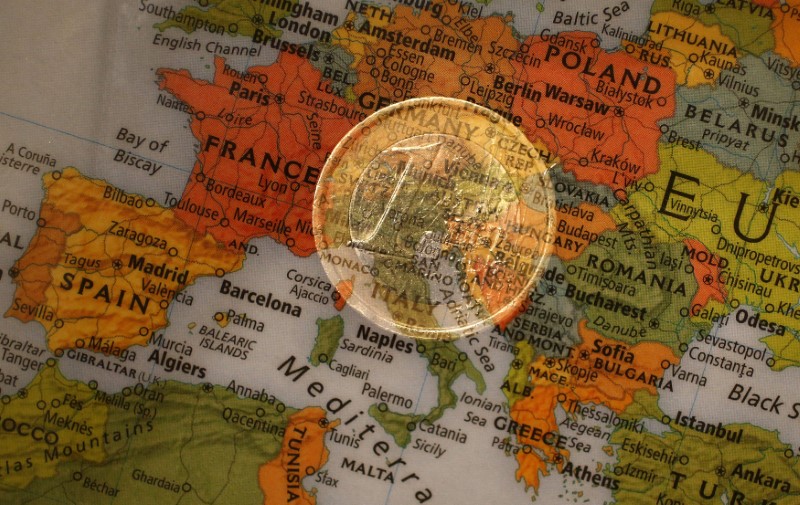By Jonathan Cable
LONDON, March 22 (Reuters) - Euro zone businesses rounded off the first quarter of 2018 with their slowest growth in over a year, much weaker than expected, as new business took another hit from a stubbornly strong euro, a survey showed.
The euro zone's economic boom had already paused in February as rising prices left a mark, and a Reuters poll earlier this month said growth had peaked, worrying for the European Central Bank as it looks to move away from an ultra-loose monetary policy.
IHS Markit's composite flash PMI for the euro zone, seen as a good guide to economic health, slumped to 55.3 this month, far below all forecasts in a Reuters poll which had predicted a more modest dip to 56.7 from February's final reading of 57.1.
Still, survey compiler IHS Markit said the data - despite severe weather also having an impact this month - pointed to robust first-quarter GDP growth of 0.7 percent, a touch faster than the 0.6 percent predicted in a Reuters poll.
"It certainly looks like growth has peaked around the turn of the year and we are on a slower growth trajectory now. That's not to say we are indicating any sort of downturn - we are still at elevated levels," said Chris Williamson, IHS Markit's chief business economist.
Since the start of the year the euro is up more than 2 percent against the dollar - and is expected to strengthen further - making the bloc's goods and services more expensive for foreign buyers.
So new business growth, which does include trade within the bloc, tapered. The sub-index fell to 55.0 from 56.3, the lowest since the start of last year.
"Export growth has more than halved since December from fairly elevated levels, which coincided with the strengthening of the euro, so some of that currency effect may be taking its toll," Williamson said.
That also affected the bloc's dominant service industry. Its PMI sank to a five-month low of 55.0 from 56.2, also below all forecasts in a Reuters poll which had predicted a reading of 56.0.
Also likely of concern to ECB policymakers, who have failed to get inflation anywhere near their 2 percent target ceiling, the output prices index eased to 52.4 from 52.9. Consumer prices rose less than expected in February, just 1.1 percent year-on-year.
Manufacturers had a similarly softer month. The factory PMI dropped two points to 56.6 from 58.6, matching the most pessimistic forecast in a Reuters poll. The median was for 58.1.
An index measuring output, which feeds into the composite PMI, plunged to a 14-month low of 56.1 from 59.6. Factory managers were also less optimistic, with the survey's future output index dropping to a 15-month low of 64.9 from 67.1.
The slowdown could be widespread, with earlier data from Germany showing growth in Europe's largest economy slowed much faster than anyone polled by Reuters had expected. A sister PMI suggested France's expansion rate had also weakened.
"It's what we might call growing pains curbing growth, especially in the fastest-growing countries ... it is then disseminating across the region," Williamson said.
There are no preliminary numbers for other euro zone countries.
